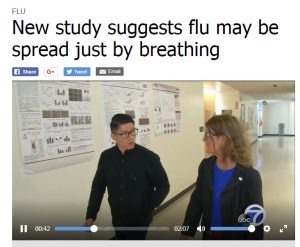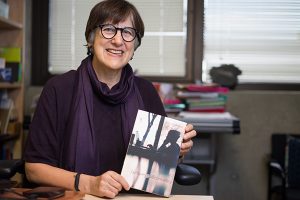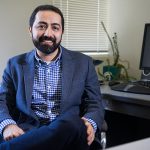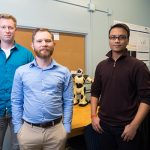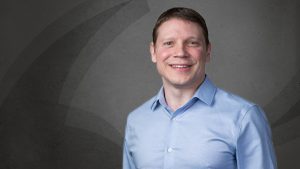
Dr. Ted Butryn is the interim founding director of the Institute for the Study of Sports, Society and Social Change at San Jose State University.(Photo by David Schmitz)
By Melissa Anderson
Last January when Ted Butryn attended the Institute for the Study of Sports, Society and Social Change (ISSSSC) Words To Action Town Hall, he was there as an observer, as a professor of Kinesiology with a specialization in sport sociology and sport psychology, and as an admirer of Dr. Harry Edwards. Edwards, ’64 Sociology, ’16 Honorary Doctorate, was a student-athlete at SJSU who has become a renowned activist and scholar. He helped to launchISSSSC, starting with a donation of historical photos, autographed books, memorabilia and correspondence that is housed as part of the Dr. Harry Edwards Collection in the Dr. Martin Luther King, Jr. Library.
When Butryn was approached to be the interim founding director of the fledging institute, he jumped at the chance to develop an interdisciplinary research center and to collaborate with Edwards.
“I met Dr. Edwards this summer and when I first started teaching the sociology of sport course at SJSU, I used to tell students, humbly, that I could never fill his shoes but I was going to do my best. I told him this story and said, looking up, that I know that now quite literally,” Butryn said, alluding to both Edwards’ reputation and 6’8” stature.
Butryn recalled first learning about Edwards’ work when he was an undergraduate student at the University of Tennessee-Knoxville, where he ran track and cross country while studying sport psychology. In an African American history course, he discovered the Olympic Project for Human Rights, and the 1968 protest by-then San Jose State University students Tommie Smith and John Carlos, who used their Olympic medal moment to bring attention to their cause.
His interest led him to SJSU, where he completed a master’s in sport psychology before returning to the University of Tennessee-Knoxville to complete a doctorate in their cultural studies and sport unit.
“I loved looking at how race, class, gender, sexual orientation, among other identities, worked and intersected in sporting spaces,” he said, of his master’s and PhD work.
Butryn has built a reputation in his own right and was named a North American Society for the Sociology of Sport Fellow in 2017. His own research has examined technology and sporting bodies and white racial identity and white privilege in sport, with his most recent research pivoting to the NFL protests. He has published more than 20 refereed articles, including four in the Sociology of Sport Journal, which is one of the top journals in the field. Along with numerous published book chapters, he also has presented more than 50 juried presentations at various academic conferences.
“ISSSSC was founded on the same principles of academic excellence and social integrity that have guided our university for over 160 years and in recognition of the influential power that sports and athletes have on our national and global cultures,” said Provost and Senior Vice President for Academic Affairs Andy Feinstein, in an email announcing Butryn’s appointment last fall. “SJSU considers the sociology of sport to be an emerging and prominent pillar in the field of social sciences and established ISSSSC to facilitate interdisciplinary collaboration, analysis and education to further our knowledge on the intersection of sport, society and social justice issues.”
In his early months as director, Butryn identified SJSU faculty who are interested in interdisciplinary research around sports and society, as well as top scholars from other universities and colleges in the US and Canada. The SJSU Academic Advisory Board members are listed online.
“We will be looking at a number of issues from different perspectives, drawing from sociology, cultural studies, psychology, and management, and using a variety of research methodologies” he said. For example, he noted that he and his colleagues are examining the media coverage of the NFL protests, how young athletes interpret the protests, as well as how sport managers can learn about how to navigate the age of athlete activism in the future.
Other potential areas for research include sports and technology, the intersections between concussions, gender, race and socioeconomic status, and the sporting experiences of racial, ethnic and cultural groups that reflect the SJSU community. The ISSSSC team is also especially interested in providing research, scholarship and creative activity opportunities for undergraduate and graduate students.
“In the fall, we plan on having student research teams led by faculty advisors presenting during the week-long celebration of the 50th anniversary of the 1968 Mexico City Olympics and SJSU’s legacy in the area of sport and social justice,” he said, noting that he would be recruiting students from numerous classes across campus.
ISSSSC will also continue to host important and timely conversations about the intersection of sports, society and social change.
The upcoming Words to Action: Gender, Sport and Society Town Hall will beMarch 14, from 8:30 a.m. to noon. The event will feature leading voices on gender equity and women’s rights in the sports world. Tickets are on sale now.
“In 1993, I remember sitting with my teammates in Tennessee watching the World Track and Field Championship 10K,” Butryn said. “I was already familiar with the Carlos and Smith protest, but they aired a brief documentary commemorating the 25th Anniversary (of the 1968 protest) that was really powerful. To be involved with the Institute leading into the 50th Anniversary at SJSU is more than a dream come true.”
